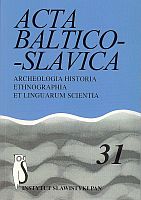Белорусские говоры (вокруг Новогрудка, Браслава, Миор и Постав) в исторической перспективе
Belorussian dialects (around Novogrudok, Braslav, Miors and Postavs) in historical sight)
Author(s): Olga Desyukevitch, Svetlana ProhorovaSubject(s): Language and Literature Studies
Published by: Instytut Slawistyki Polskiej Akademii Nauk
Keywords: Grand Duchy of Lithuania; dialect; conceptualization; ‘prosta mowa’; ‘po prostu’; ‘pa tutejszamu’
Summary/Abstract: The article aims to regard the linguistic situation on the territory around Novogrudok, Braslav, Miors and Postavs as succeeding to the linguistic situation of the Grand Duchy of Lithuania. The linguistic situation is presented from linguists’ standpoint and through the eyes of the native dialect speakers. They conceptualize their native dialect in conjunction with Polish, Byelorussian, Russian; they have used to choose one of the languages depending on the situation. Interviewees denote that they experience a pressing need to have a perfect command of several languages. This very situation originates in the language situation of the Grand Duchy of Lithuania. The native speakers of the dialect consider their language to be a mixed one. The polish people inhabiting that territory conceptualize the Polish language as the sacred language of church. The citizens of the explored territory of the Vitebsk region as well as all the citizens of the border districts are characterized not only with the ability to choose the spoken language according to the situation but with a habit to comprehend each speech act deeply as well. Complicated language situation within which the interviewees exist from birth and which was inherited from the Middle Ages force them to set a priority between the native dialect (plain language), Polish, Russian, sometimes Lithuanian depending on circumstances. The native speakers of the dialect entirely comprehend current situation on the territory they inhabit. First of all it is the characteristic feature of the elderly people who maintain their own dialect. Young people speak Russian in general, though they can speak both Belarussian and Russian and understand Polish speech. The language situation on the territory of the Vitebsk and Novogrudok regions as stated above inherits the situation of the Grand Duchy of Lithuania, which is being searched now as an experience of interaction and enriching of several languages within one and the same country.
Journal: Acta Baltico Slavica
- Issue Year: 2007
- Issue No: 31
- Page Range: 205-212
- Page Count: 8
- Language: Russian

